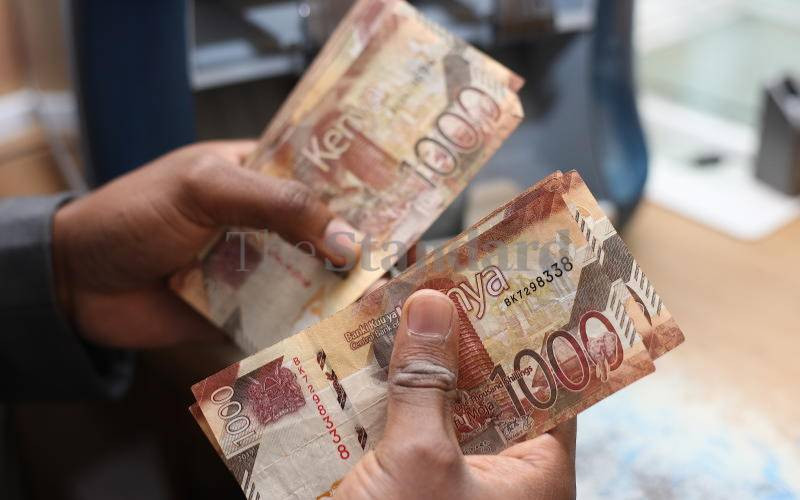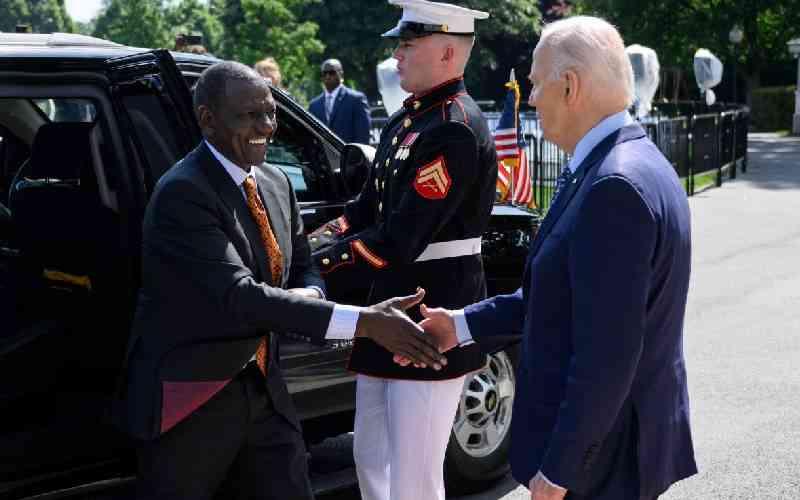
President William Ruto's economic team says it has made a breakthrough in stabilising the economy.
Officials have repeatedly insisted that they took over the government when there was choking debt, unsustainable high cost of living, and economic despair.
But key economics in the Dr Ruto government now say that though the country is not out of the hoods yet, the economic crisis has been contained and foresee the cost of living coming down in the next month, and a return to normal in the next financial year.
"We are confident about the turnaround. The future is looking better now. Inflation is coming down, in January 2023 it was at 9 per cent down from 9.6 per cent in November. Treasury has estimated seven per cent by end of the calendar year," said David Ndii, the President's economic advisor.
In an interview with The Standard, Dr Ndii and former Treasury PS Kamau Thugge said that when President Ruto took over, the economic future looked bleak and the reality was grim.
They said the deficit that had been approved by the previous government stood at Sh862 billion, and an additional Sh297 billion that was not accounted for, therefore the real deficit Ruto found was at Sh1.159 trillion.
"We needed a quick intervention to save the situation. The President said he will bite the bullet and go for austerity. Today, we have improved our fiscal framework, the inflation is down to Sh834 billion and inflation is coming down," Dr Ndii said.
He said by the time Ruto was sworn into office in September 2022, the country was having difficulties borrowing from the international market, and even attempts by the Uhuru Kenyatta regime were aborted.
Austerity, removing subsidies and fiscal discipline was thus a prerequisite for the new government.
"We knew from the word go that we were in a financial crisis. We had to make tough decisions or go the Sri Lanka, Ghana way," he said.
Ghana in December suspended payment of its external debt including concessional loans, Eurobonds and commercial loans, saying the situation was an emergency intervention measure.
Months before, Sri Lanka plunged into an economic crisis due to unsustainable debt, occasioning shortages of basics such as fuel, food and medicines with the inflation rate at more than 50 per cent, triggering civil unrest across the country.
"Everyone else was saying Kenya would be the next country to plunge into an economic crisis and indeed were it not for the decisive position by the President on the austerity, we would have gotten there, but fiscal discipline by the government saved the situation," said Dr Ndii.
He noted that the Sh300 billion austerity ordered by Ruto was a difficult decision to take but a bold one that has slowed down the country's borrowing.
Stay informed. Subscribe to our newsletter
"Our domestic interest rates have not gone up given the pressure on the dollar, so marginal increases. Our bond yields have declined from around 17 per cent to below 10.5 per cent."
In mid-November, President Ruto told Kenyans to brace themselves for tougher times even as he directed the National Treasury to slice this year's budget by Sh300 billion, citing the country's difficult financial situation amid limited revenue.
While addressing the inaugural session of the joint sitting of the 13th Parliament after the August 9 General Election, the Head of State said the increased borrowing to finance recurrent and development expenditures had aggravated public debt.
"I have news, and it is not very good news. Our financial situation is not very good," he told the joint sitting.
Dr Ruto said that over the next three years, Kenya must reverse the financial situation and go back to where the government contributes to the national savings effort by keeping recurrent expenditure below revenue.
"To this end, I have instructed the National Treasury to work with ministries to find savings of Sh300 billion in this year's Budget. Next year, we will bring it further down so that, by the third year, we have a recurrent budget surplus."
To realise the deep budget cuts, the likely target areas would include hefty government staff allowances, expenditure on hospitality, unnecessary foreign trips by government employees, and capital-intensive projects, or those that have no immediate impact to spur economic growth.
Thugge, also an advisor in the Kenya Kwanza government, said investor confidence in Kenya had increased.
"When we came in, our bonds were trading at a discount of 17 per cent...today we have brought it down to 10.5 per cent," he said.
Thugge said the environment has changed because investor confidence had been regained, which can now enable the country to borrow in the market which had been closed out.
"Domestic borrowing, we could not get the money. We always went to the market and came back less. Now they are lending to us and the private sector," he said.
"The reason why banks were not lending to the government was because of risk. The international market as well has embraced us."
He added: "This means that if we go on this path, we have tidied ourselves through this crisis and can now go to our development."
Thugge said the market was oversubscribing because the government had released the pressure on domestic market and the local banks were now lending more to the private sector since 2016.
"We are looking at the situation in the next year or so when we will stop borrowing from the local market and the banks will have a lot of money to hawk to the private sector, which is the driver of the economy."
International lenders
The economists said the World Bank had indicated a willingness to inject $1 billion (Sh128 billion) into the economy while some international capital market players had also pledged a similar amount on or before the beginning of the next financial year.
"This indicated that warm reception international lenders now have with Kenya, they are amazed at the fiscal discipline we have exuded," said Thugge.
On the elusive dollar in the market, Ndii said they were in talks with some giant fuel firms in the Gulf to enter into long-term contracts that can allow Kenya to pay for fuel even after six months. "This move will ease pressure on the demand for dollars to buy fuel, we import fuel worth $500 million every month," said Ndii.
"This means we continue to deplete our reserves with every purchase. But in the current arrangement, we will have dollar reserves with us for six months circulating before we release to pay fuel."
On subsidies, he said it did not make sense for the country to spend billions on cushioning food prices when there was no production.
"We reasoned that instead let's put the billions in production. This will afford us a lasting solution on food security while at the same time putting money in people's pockets through sale of the food."
[email protected]
 The Standard Group Plc is a
multi-media organization with investments in media platforms spanning newspaper
print operations, television, radio broadcasting, digital and online services. The
Standard Group is recognized as a leading multi-media house in Kenya with a key
influence in matters of national and international interest.
The Standard Group Plc is a
multi-media organization with investments in media platforms spanning newspaper
print operations, television, radio broadcasting, digital and online services. The
Standard Group is recognized as a leading multi-media house in Kenya with a key
influence in matters of national and international interest.
 The Standard Group Plc is a
multi-media organization with investments in media platforms spanning newspaper
print operations, television, radio broadcasting, digital and online services. The
Standard Group is recognized as a leading multi-media house in Kenya with a key
influence in matters of national and international interest.
The Standard Group Plc is a
multi-media organization with investments in media platforms spanning newspaper
print operations, television, radio broadcasting, digital and online services. The
Standard Group is recognized as a leading multi-media house in Kenya with a key
influence in matters of national and international interest.






